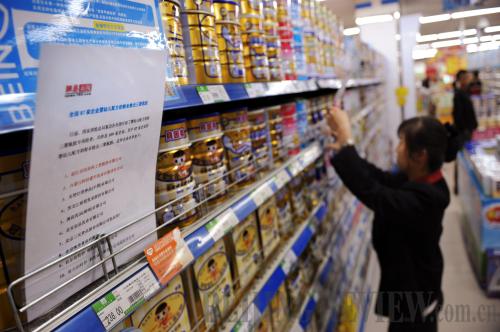|
 |
|
HIGH ALERT: A saleswoman posts a list of melamine-free milk powders at a supermarket in Yinchuan, Ningxia Hui Autonomous Region (XINHUA) |
Full Disclosure Necessary
The average annual pay for senior executives of state-owned enterprises (SOEs) hit around 600,000 yuan ($87,848) last year, which was 35 times the per-capita disposable income of urban Chinese residents in 2009 of 17,175 yuan ($2,515). But Li Rongrong, Minister of the State-owned Assets Supervision and Administration Commission (SASAC) of the State Council, says this was not too high.
It's reported one third of the pay for senior SOE executives is basic salary and two thirds connected with their performance. Minister Li said that the reason some senior SOE executives could earn a comparatively high basic salary was because they had led their companies to realize sustainable growth.
But it is still unclear what factors have remarkably boosted senior SOE executives' salaries? Results of a survey conducted by the SASAC show that the average annual pay of senior SOE executives in 2008 was 531,000 yuan ($77,745). The financial crisis has had a negative influence on most SOEs' performance, and thus the average annual pay of senior executives should have decreased, rather than risen.
The SASAC knows the salary of each senior SOE executive, but only tells the public the annual average figure. Full disclosure of individual salaries is needed. The public, not SASAC, should be able to decide whether their salaries are too high.
Yanzhao Metropolis Daily
SOE Problem
The website of the State-owned Assets Supervision and Administration Commission of the State Council said, from 2010, within five years, hotel business attached to centrally-administered state-owned enterprises (SOEs) whose major business is not hotel operations, will be split off from them.
Today, more SOEs are developing other businesses. Of the 130 centrally administered SOEs, more than 70 percent are engaged in the property industry. However, the unrestrained expansion of SOEs is making a mess of China's economic environment.
Distracted by side businesses, some centrally administered enterprises no longer devote themselves to their economic and social responsibilities. Their close connections with the government, and the privilege of monopoly in certain fields help them beat rival enterprises and gradually eliminate fair competition in the marketplace. Take the property market, for example. The involvement of mammoth SOEs that formerly developed in other sectors has greatly pushed up land and housing prices.
The assets of SOEs belong to the public. When they operate side businesses, they risk the whole nation's interests. According to sources with the State-owned Assets Supervision and Administration Commission of the State Council, in the latest global financial crisis, 68 centrally administered enterprises suffered an estimated loss of 11.4 billion yuan ($1.65 billion) from financial derivatives—and taxpayers have to lump it.
It is not enough to separate hotel business from centrally administered SOEs in other sectors. SOEs must quit all side businesses.
Yangcheng Evening News
Toxic Milk Dying Hard
A 10-day dairy quality inspection was recently carried out in Guangdong Province. It was found a lot of melamine-contaminated milk powders that were not destroyed in an industry-wide overhaul in 2008 had been brought to market again.
Greedy manufacturers do not want to retreat from the market. In 2009 there were many reported cases of toxic dairy products and almost all of them had been produced from melamine-contaminated milk powders that were already in stock.
After the exposure of the melamine scandal in 2008, only several major cases were made public though toxic milk powders killed at least six children and sickened 300,000 others. This kind of selective punishment does not work at all. We should not tolerate even a minor problem concerning food safety, because any hazardous ingredient might risk consumers' health. To ensure that no one will be affected by toxic food, safety and health watchdogs should always keep close watch.
Procuratorial Daily
Technology Not Panaceas
In north China's Liaoning Province, apart from the traditional methods for local people to submit complaints to the government such as personal visits, letters, e-mails and telephone hotlines, a SMS service is now available.
Modern information technology offers more choices for petitioners but does not necessarily mean better efficiency. For example, in a town in Jiangsu Province, there is a limitation on the length of complaint posts on the local government's website: If a post has more than 100 Chinese characters, it will not be received.
Whatever means are employed in filing complaints, the thing that really matters is the government's willingness and determination to solve people's problems. For a willing government, every letter or call or visit from the people is important and quick and effective action is taken. But for an indifferent government, no matter what hi-tech applications are available, they just don't want to deal with people's complaints.
Hi-tech applications will only work effectively on the basis of the government's strong willingness to interfere. Here, what is being tested is not technology but government attitudes toward ordinary people.
Changjiang Daily | 